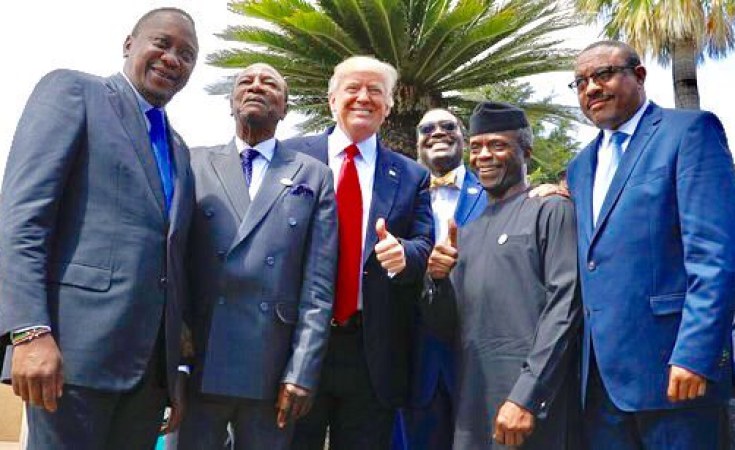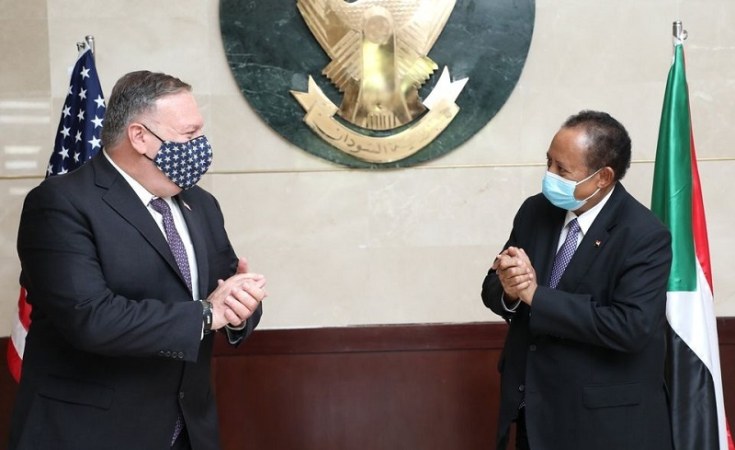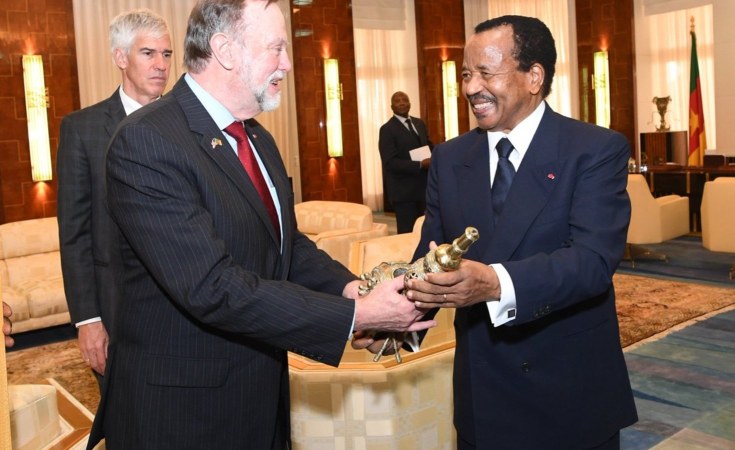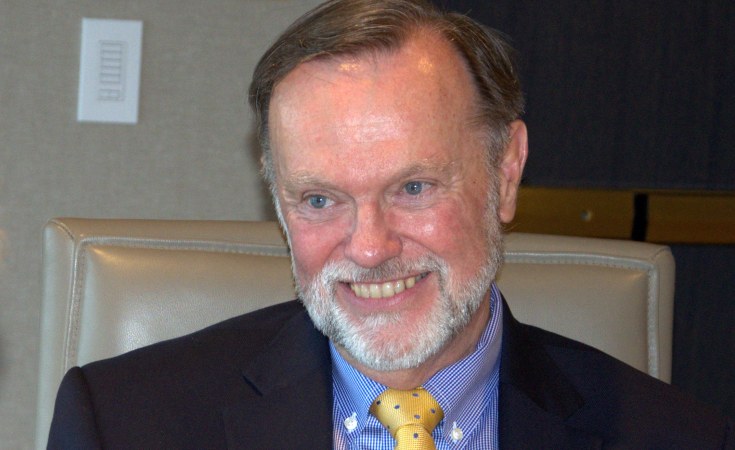Washington, DC — At the end of his tenure as the top Africa policymaker in the State Department, Assistant Secretary Tibor Nagy says the legacy of the outgoing administration includes a number of 'concrete achievements' that have strengthened U.S. ties to Africa. Nagy, who assumed the post in June 2018 nearly two decades after retiring as a career foreign service officer, which included ambassadorial tours in Guinea and Ethiopia under Presidents Bill Clinton and George W. Bush, was interviewed by AllAfrica's Reed Kramer on 15 January. Among the successes on Nagy's list are continuation of the Young African Leaders Initiative, which was started by President Obama, and the Trump administration's launch of the University Partnership Initiative. He also points to diplomatic breakthroughs in Sudan and political transitions in the Democratic Republic of the Congo, Angola and Mauritania, as well as in Ethiopia – where he acknowledges there remain serious problems. Nagy leaves office when the new president is sworn in on January 20.Tweets from his official Twitter account are interspersed in the interview.
In your interview with AllAfrica shortly after taking office, you stressed the importance of Africa's youth as a force for change across the continent. What have you accomplished in that arena and what more do you wish could have been done?
I have been really happy about the continued acceleration of the Yali program [Young African Leaders Initiative]. Early in the administration, there was a certain amount of skepticism, but I think the leadership became true believers. In partnership with that, we came up with the University Partnership Initiative - which I am beyond passionate about and am going to keep working on – partnering U.S. universities with African universities, including a U.S. minority-serving institution, an HBCU [Historically Black College or University] or Latino-serving institution.
This involves student exchanges, faculty exchanges, research exchanges; the possibility of dual-degree programs; exchanges on university administration; and - a very important component - to integrate the private sector into university programs. That has been lacking in Africa. The private sector can bring not only tremendous resources but also the knowledge of what kind of degree programs they need to employ the people that are being graduated. We started a model program, initially, with what I consider to be a very modest budget of $3 million, and we ended up benefitting a large number of universities on the African side and but also on the U.S. side.
Those are the kinds of programs that the incoming administration will look at because - in Africa - it really is about the youth. It's about employment and economic opportunities. But it's also about good governance.
How do you think this administration's legacy in Africa will be remembered?
There are a handful of very concrete achievements. We don't know what historians are going to say, but I think that these will be looked at very carefully. Some just got through the finish line - for example, getting Sudan off the list of state sponsors of terrorism; having a negotiated agreement with the Sudanese government to pay compensation to the victims of the embassy bombings, the USS Cole. Sudan was considered an international pariah, and the relationship [with the United States] turned 180 degrees to Sudan being one of our foremost partners. I think that the future of that relationship is just phenomenal. So that's one.
--------------------------------------------------
Tibor Nagy Retweeted Cale Brown @StateDeputySPOX Dec 30, 2020
The Sudan Claims Resolution Act is crucial to secure compensation for victims who have suffered from terrorism. The Act strengthens the U.S.-Sudan relationship, cementing the progress made by the Sudanese people on the path towards democracy.
--------------------------------------------------
Another big one has to do with DRC [Democratic Republic of the Congo]. I remember that there was an incredible amount of skepticism when Etienne Tshisekedi became president. A lot of criticism. Again, historians are going to be the judge, but I think the administration called it right. President Tshisekedi has done so many positive things. I think his timing has been about as perfect as can be. I have said in my speeches that - for the first time in its history - the DRC may actually become democratic and a republic.
Another one – which has had recent problems - is Ethiopia. It started well, both the internal policies that Prime Minister Abiy was pursuing, but also Ethiopia's role in the region: making peace with Eritrea, helping with South Sudan, helping with Somalia.
Then we get into Covid and the delay of the elections, the TPLF [Tigray Peoples Liberation Front] not only going its own way but becoming belligerent, and actually starting a conflict with Ethiopia. I've tried to note this a number of times: there is no equivalency between a sovereign state and a province whose leadership is not trying to secede - the Ethiopian constitution has provisions for secession - but is trying to reimpose themselves to the favored status that they had in the old regime. The conflict was terrible. The loss of human life was terrible. And the humanitarian emergency continues - very disturbing trends with credible reports of Eritrean participation in that. And now, more ethnic fractures [and] border tensions between Ethiopia and Sudan.

What needs to be done to insure unhindered access by aid organizations – something you and others have demanded but which has gone unheeded by the Abiy government?
The humanitarian emergency is there, the internally displaced people are there. The Ethiopian government could play and should play a coordinating role facilitating access to distribution. There should be an independent investigation of very credible reports of human rights violations - who did what and who was complicit? The entire international community is on the same side, so I believe that that is going to happen.
The question now is how the Ethiopian government is going to treat Tigray. Because in many respects, the TPLF is ingrained into Tigrayans DNA, having been there for the initial liberation struggle, going back even to the time of the Emperor. Beating Mengistu [Haile Mariam, who ruled Ethiopia from 1977-1991], taking over and running the Ethiopian government. How's the Ethiopian government going to deal with that? It's essential to bring the Tigrayan people back, because, if the population becomes hostile to the Ethiopian government, then it's not going to be a low-level insurgency. It will become an acute insurgency.
--------------------------------------------------
Tibor Nagy @AsstSecStateAF Jan 18
We call upon the communities involved in recent violence in West Darfur to stop retributive violence and start dialogue. We also encourage the Sudanese government to continue deploying police units to halt attacks and to redouble efforts to implement the Juba Peace Agreement.
--------------------------------------------------
I'm still very optimistic overall about Ethiopia. It's gone on for 2000 years. It has faced incredible crises. So I'm hoping that the elections go forward next June, and that they will be able to come to some kind of resolution with Tigray.
Another success has been in Angola. I think President João Lourenço has perfectly timed the steps he has taken in his anti-corruption campaign. He started small, with the low-hanging fruit, and climbed higher and higher into the tree. We wish him every success. Angola is one of the richest countries resource wise, but [has] incredible poverty. The population has never been able to participate in the wealth. There is hope, with President Lourenço, that is going to change.
Another success, I would look at is Mauritania. The United States has been very supportive of the new president and his changing the direction of the country, acknowledging some of the long historical problems that they face and willingness to confront it in as realistic way as he can. We wish every success there.
These things that I'm mentioning, obviously they're going to go on into the next administration. But I think the start by our administration has been significant.
I'd like to follow up on all of these, but we lack time. Another area of success you have cited is related to U.S. trade and investment with Africa. How would you assess progress in this area?
The African youth are going to need real jobs, and the best way to provide jobs is outside investment. We've had the Prosper Africa initiative that has come to be the foundation and I hope the next administration will continue that. For the first time ever, in the 60-plus years we've had relations with Africa, the United States of America has a one-stop shop for investing in Africa.
But equally important, in Africa with all of our embassies - from the largest to the smallest - we have established deal teams to assist American companies wanting to invest in Africa and African companies wanting to trade with the United States. But also to engage host governments on what they need to do to put in place the type of environment which will be attractive to serious, conscientious businesses that don't do deals under the table, that don't leave behind envelopes full of cash, that don't smuggle out ivory tusks and things like that.
We've been adding funding to the recently established Development Finance Corporation, upping it to $60 billion. We hope that will be a good incentive for getting American companies, that never would have thought about Africa, into Africa. American companies are always looking for a good deal. Up to now, I don't think that they've gotten the type of government support that they should have had.

--------------------------------------------------
Tibor Nagy @AsstSecStateAF Jan 18
As I conclude my time in the Bureau of African Affairs, I am pleased to see the #AfCFTA launch, and look forward to seeing its benefits for intra-African trade and economic growth, especially for women owned businesses and small and medium enterprises. @US_AU @AfCFTA
--------------------------------------------------
What role does the United States have in supporting the emerging African Continental Free Trade Area (AfCFTA)?
We support it very strongly. That's the foundation. At the same time, we're still at a symbolic stage. We look forward to working energetically to help with various technical issues and legal issues.
We know that Agoa (the African Growth and Opportunity Act) is going to expire in a couple of years. What will replace Agoa, obviously, will be up to the next administration. Meanwhile, we have ongoing negotiations for our first bilateral free trade agreement with sub Saharan Africa - with Kenya. How will that interact with the free trade area is to be worked out. You know that I'm an Afro-optimist, and I hope that the Africa-wide agreement will lead to absolutely fantastic developments - transportation, logistics, access and others.
You mentioned progress in Mauritania. But across the Sahel, the security situation has continued to deteriorate - in Burkina Faso, Niger and Mali, as well as northern Nigeria. Your colleague, Special Envoy Peter Pham, has been very active on the diplomatic front. What kind of ongoing diplomacy as well as social and economic response is needed to complement military action?
The problem with the Sahel has been that the weakest link has affected everything else. And the weakest link historically has been Mali. Extra-constitutional change in government is not anything that we ever support. Now, Mali is transitioning through the current hybrid government to – we hope – a partner that will be a lot more effective in the fight against extremism.
In Burkina Faso, I think you saw that had a fairly well-done election. Niger the same. Now if Mali can become serious about implementing the Algiers Accords, confronting its terrorism problem, then - when the transition is completed - we may have a much more effective partner.
--------------------------------------------------
Tibor Nagy @AsstSecStateAF Dec 28, 2020
Congratulations to the Nigerien people and the Government of Niger on holding peaceful presidential and legislative elections on Dec. 27.
--------------------------------------------------
Nigeria, the same thing. Boko Haram started out as a small movement. Because of mishandling initially by the Nigerian government, it expanded just incredibly in activities and coverage. Now, the Nigerians are finally taking it very seriously. Post COVID, I hope they can be much more aggressive in confronting both ISIS and Boko Haram.
The whole terrorism issue is one that definitely has not improved over the last number of years. New places are suffering, and the new administration is going to have to be very actively involved working with partners to reverse that. The Europeans are more focused now on the Sahel. The international community is more united. And, yes, the economic part goes with it. Because in these situations, it never, ever is just a military solution.
You mentioned three special envoys.
I've never been a big booster of special envoys but the three we have were required by the situations, and they have all three done a phenomenal job. Peter started out in the Great Lakes and then transitioned to the Sahel. We have Ambassador Donald Booth, working on the Sudan – [with] his contacts, legwork, indefatigable energy, optimism, willingness to engage. A lot of the credit goes to Don Booth for what the United States has been able to achieve with Sudan.
Our indefatigable former ambassador in Nigeria, Stuart Symington, took on South Sudan, which seemed like a hopeless case. But now, there's a start to a peaceful transition there. A lot of the credit goes not just to Stuart, but also to a number of special envoys. Everybody wants South Sudan to succeed. We can all hope for considerable progress over the next several years.
Somalia is another country that I leave here very troubled about. When I left the diplomatic service in 2003, Somalia was suffering, and there was a terrorist group there, which was committing atrocities. When I came back to diplomatic service, almost 20 years later, Somalia was still at that point, rather chaotic, and the extremist organization running around - al Shabaab - was much stronger than it had been. There has not been much progress.
Now we're facing another election, which I hope will be better than the last election. We were able to reopen our embassy in Mogadishu. During the past two years, we have had an extremely capable Ambassador there - Don Yamamoto. Again, the international community is united. We have expectations of the Somalis to do their part of the partnership, so that the country can move forward. And I have a certain amount of optimism; I really hope there is progress over the coming year.

To follow up on Nigeria, the administration has been criticized for being slow to condemn the government's crackdown on dissent and the killing of the #EndSars protesters and has been accused of failing to pressure President Buhari to crack down on corruption. What is your response to those criticisms?
I also hear people say, "Why is your administration putting Nigeria on every single bad list?" Nigeria is a hugely complicated country. When I served in Nigeria, we used to say that a week of service in Nigeria was like a full tour anywhere else. Nigeria has historically been beset with a series of very severe problems. A huge country, hugely important to the United States, hugely important to Africa, but very serious problems. You talk about corruption. How far back does it go? How deep is it? It's there, and it's not going to be erased in a night. There has to be a culture change in Nigeria.
I feel like this administration has criticized Nigeria as energetically as any other administration has. But the results don't come from criticism. The results come from the leadership in Nigeria having a willingness to confront these problems. And until that happens, the problems are going to persist, and they're going to worsen.
Let me ask you about the Covid-19 pandemic, which has overshadowed everything in the past year. What should the United States do to ensure that Africa is not left out as vaccinations become available in wealthy countries?
In some respects, Africa did better than initial predictions, in part because of a youthful population. Africans have had to endure and build resistance to very serious illnesses, whether malaria or Ebola. African health systems, underdeveloped as they are, responded very well. And here I will give credit to the United States. Since 2000, the United States of America has spent $100 billion on African health systems and has contributed $490 million for the Covid emergency in sub-Sahara Africa.
When the pandemic first hit, our priority was getting American citizens out of Africa and also getting vulnerable members of American embassies out. So we had our embassies working 24 hours a day with reduced staff. They did a phenomenal job.
Then we transitioned to what we could do to help countries - with PPE (personal protective equipment), with ventilators. What do we need to do for the longer term is to promote economic recovery and employment? African economies have been devastated. But the prediction is that - by the end of 2021 - most African countries will return to positive economic growth.
Before we conclude, could you comment on several countries undergoing particular crises these days, starting with Uganda?
Yeah, this has not been a good year for democracy in Africa. What happened, unfortunately, is what we feared would happen - authoritarian leaders in Africa taking advantage of the Covid emergency in further closing political space and further manipulating elections. I do like consistent U.S. policy. We do have a candidate in every election, and that [candidate] is the process. We don't care who wins, as long as they follow an equitable process.
--------------------------------------------------
Tibor Nagy @AsstSecStateAF Jan 15
We are deeply troubled by persistent reports of fraud in Uganda's January 14 elections, the Ugandan authorities' denial of accreditation to election observers, violence and harassment of opposition figures, and the arrest of CSO members. [1/3]
Coupled with authorities' denial of accreditation to observers, Uganda's electoral process has been fundamentally flawed. We warn against actions against opposition candidates or their supporters, those responsible will be held accountable. [2/3]
We continue to urge restraint and rejection of violence by all actors as Uganda's election results are announced. The immediate and full restoration of Internet connectivity is essential. The U.S. response hinges on what the Ugandan government does now. [3/3]
--------------------------------------------------
In Uganda, it's up to the people to accept the results, and we'll reserve judgement. But it doesn't look good right now. It was much the same story in Tanzania. I talked to 20 thousand of the Yali network [this week], and this is an issue we got into. The comment I made is that fundamentally any leader has to believe they are there to serve the people, not the other way around. If they do, the political space will work. It is up to the next generation to bring in leaders who are truly working for the people. At that point, countries which have wealth but some of the poorest people, will transform very quickly to countries where the people themselves will also be wealthy.

--------------------------------------------------
Tibor Nagy @AsstSecStateAF Retweeted Jan 19
Individuals who undermined Tanzania's democratic process are not welcome in the United States. @SecPompeo has imposed visa restrictions to hold accountable those responsible for Tanzania's flawed October 28, 2020 general elections.
--------------------------------------------------
Frustrations, regrets?
Cameroon and Zimbabwe - two countries that I know very well - are my biggest regrets, I have to say. In Cameroon, you have a president who I don't believe has been made fully aware of the dangers to his country's unity that is posed by the secessionists in the Anglophone region. Gandhi, the genius, said that 'an eye for an eye' results in the world being blind. And that's exactly what's happening in that area. There is no end in sight to the horrors that are going on there.
--------------------------------------------------
Tibor Nagy @AsstSecStateAF Jan 15
The cycle of violence in Cameroon continues to break my heart. I offer my deepest condolences to all of those affected by the attacks since the start of the year. I hope to see perpetrators held accountable and justice served for all who desire a more peaceful future.
--------------------------------------------------
In Zimbabwe, the United States is a very convenient scapegoat for the government. They accuse us of being responsible for the pitiful state of their economy because of sanctions. We have no sanctions against the Zimbabwe government. We have sanctions against individuals, and some companies. If they want to find the culprit for why Zimbabwe is in such a sad state, they need to look in the mirror. I wish Zimbabwe and Cameroon were in a much better state as I leave here. And hopefully, during the next administration, things there will improve dramatically, because both of those countries can be stars without any doubt whatsoever.
--------------------------------------------------
Tibor Nagy Retweeted Jan 19
U.S. Embassy Harare @usembassyharareh
Two years. When will Zimbabwe investigate, prosecute, and convict government security forces accused of rape, torture, and killing civilians in Jan 2019? Two years is too long to seek justice/answers/accountability.
--------------------------------------------------
Mozambique has also been very problematic. The insurgency in the north started out - much like Boko Haram in Nigeria - as an amateurish movement. Unfortunately, it has grown exponentially, to the point where the extremists have been in effective control of the port city there for, I believe, about six weeks. The international community is united in its willingness to work with Mozambique to help put an end to that. It must be a multi-pronged approach. It cannot only be military; it has to be also economic and development, governance. But it can be turned around. Our impression is that the Mozambican government is aware of the seriousness. For a while they were very much focused on their internal peace deal with Renamo [Mozambican opposition movement] than the breakaway part of Cabo Delgado province. Now full attention can be given to Cabo Delgado and finding ways to end the insurgency there.
--------------------------------------------------
Tibor Nagy @AsstSecStateAF Jan 19
We call on CAR's political leaders to adhere to the democratic principles of good governance and equal treatment for all under the law, and to build an inclusive government that represents and serves all Central Africans.
--------------------------------------------------
I'll end with a question about an issue that the administration has been engaged in, but remains unresolved - the dispute between Ethiopia, Sudan and Egypt over the Grand Ethiopian Renaissance Dam, known as the GERD. Many would say this administration has sided unfairly with Egypt. What are the prospects for resolving that dispute?
There are a lot of complicating factors there. I have not been involved in the negotiations, and I'm not a 'dam' expert. That has been a difficult subject, because there are really two issues involved. One is the dam itself. The other one is the whole issue of the Nile. It's up to the three countries to decide how best to resolve their issues - the technical, the filling [of the dam], and larger issues. There are a number of areas where there is agreement, so one approach would be to start with those areas where there's a common view. But, again, it's totally up to them. One factor is that every Ethiopian agrees on the GERD - it was largely the Ethiopian community that paid for the dam, and Ethiopians agree on its central importance. So that puts the Ethiopian government in a somewhat complicated position, because they have elections coming up. We wish them every success on that, because it's critically important to Ethiopia, to Sudan, and especially to Egypt.
Thank you for your time and best wishes in your retirement.
Yes, I have now retired three times and I'm looking forward to not having to set the alarm.
AllAfrica interviews are lightly edited for length, context and flow.


